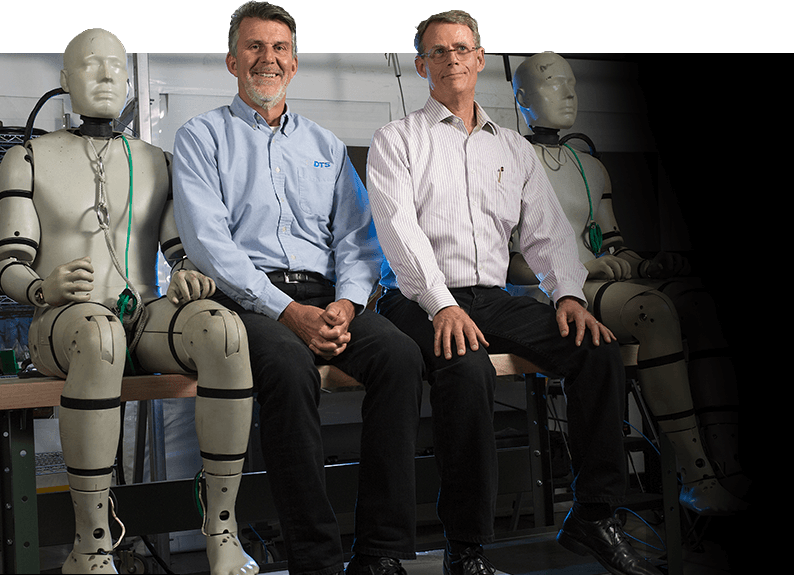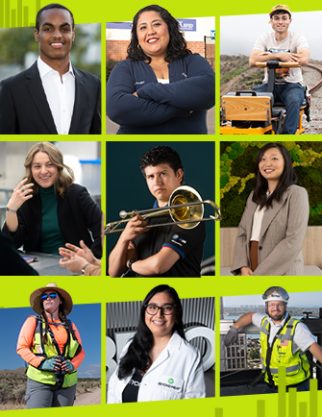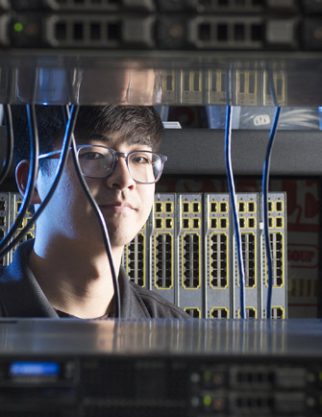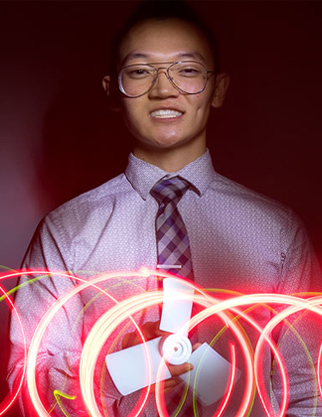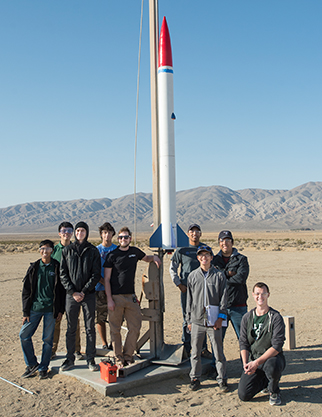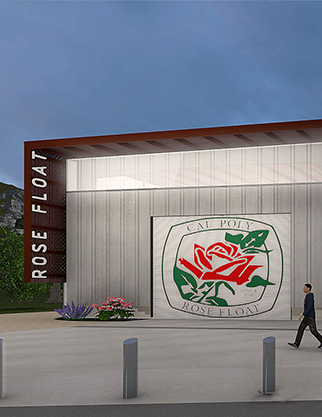Maximum Impact
Engineering Alums Put Product Performance to the Test
Watching car crashes really piques Tim Kippen’s curiosity and imagination. Specifically, he’s interested in setting up a crash, calculating the physics of the collision and then watching it unfold.
Over a career spanning 30 years, supporting car crashes and testing in extreme environments has been a large part of Kippen’s job as chief technical officer of engineering at Diversified Technical Systems (DTS).
He’s one of three crash-test engineers, including another Cal Poly Pomona alumnus, who founded DTS, an entrepreneurial success story that began in 1988. The co-founders share a passion for experimentation and problem-solving, saw an opportunity in the market and joined forces to launch their dream.
If you’ve ever buckled a seatbelt, put on a football helmet or flown in an airplane, chances are you’ve benefitted from sensors, data recorders and software made by the Orange County-based company.
Mike Beckage (’87, engineering technology), chief technology officer at DTS, often points to the crash- test rating on the sales sticker of new cars to explain what his company does.
“For many of those vehicles, that star rating was developed by using the sensors, data acquisition and the software that we deliver to allow vehicle manufacturers to make those safety calculations,” Beckage says. “The goal is to have an integrated device that gives us insight as to what might happen to a real person and how to protect them. They absolutely save lives.”
The goal is to have an integrated device that gives us insight as to what might happen to a real person and how to protect them. They absolutely save lives.”
Beckage and Kippen’s friendship began in an engineering materials class at Cal Poly Pomona. Beckage recommended Kippen for a part-time job as a crash test engineer at Mobility Systems, where they also met Steve Pruitt, who would become co-founder and CEO of DTS.
“Testing and crashing cars sounded like a really good thing. That’s how I fell into it,” says Kippen (’89, engineering technology) . “It’s the most fun thing in the world to set up a big physics experiment, think about how something is going to wreck and then just do it. And you do it over and over. We thought the industry was underserved, and that’s how we moved forward.”
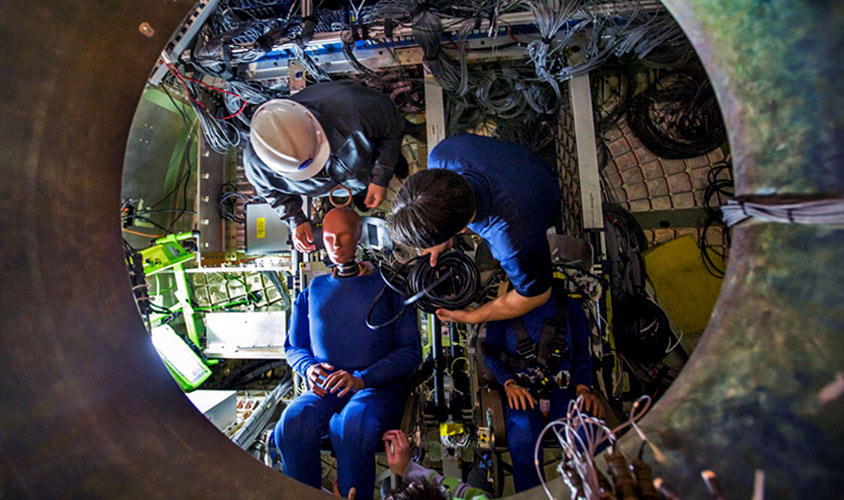
After college, the three worked full-time engineering jobs and devoted nights and weekends to their idea of creating miniature rugged data recorders and sensors, doing ground-up design and prototyping out of their homes. A couple of years later, they rented a garage loft office in Long Beach with enough space for a work bench, office and storage.
Soon, the founders were at a crossroads. The new company needed their full-time commitment and eventually more space, but they weren’t consistently profitable yet.
Beckage remembers the initial terror of taking the next leap.
“Literally quitting a job, a perfectly good job … it was kind of scary for a while because it meant there was no longer a guaranteed source of income, and it meant that we had to pull it together ourselves,” he says. “It was initially really scary, but it went away in a week. It was displaced by a feeling of freedom. That was a great feeling.”
Literally quitting a job, a perfectly good job … it was kind of scary for a while because it meant there was no longer a guaranteed source of income, and it meant that we had to pull it together ourselves.” Beckage says.
Like many entrepreneurs, they experienced their share of growing pains learning to manage a new business and developing their products and services.
“The first bit of money goes to pay the rent and the utilities. It doesn’t go into your pocket. Your income is at risk. There were quite a few months when we didn’t get a paycheck,” Kippen says. “That’s really the moment of truth. Either you’re going to give up in six months or a year like a lot of businesses do and go back to working for someone else, or you’re going to push through it.”
Hiring more employees also felt risky.
“As you get to a certain point, you recognize that the company doesn’t run without its people,” Kippen says. “If those people don’t show up, we just can’t run around and cover all of the desks and phones and computers and everything that has to be done. We rely on those people and we’re really happy to have them.”
It was a data acquisition system that could be used in car crash tests to measure acceleration, strain, voltage, temperature and other factors.
When the system first went to market, customers considered it substandard and under-featured. Motivated by that criticism, Beckage, Kippen and Pruitt redesigned the device twice in about year to exceed what was then available on the market.
“We pushed it to the limit of what we could achieve and what we could promise,” Kippen says. “That was at a time when there wasn’t a ton of money coming in. You’re basically doing 100-hour weeks, not seeing a lot of income. This is the challenge we took on.”
We pushed it to the limit of what we could achieve and what we could promise,” Kippen says. “That was at a time when there wasn’t a ton of money coming in. You’re basically doing 100-hour weeks, not seeing a lot of income. This is the challenge we took on.”
In 1999, TDAS PRO (Version 3) was ready for prime time for major car companies like Honda, General Motors and Toyota. It was smaller, modular and designed to support the high channel count safety and regulation testing that vehicles must pass in order to be sold in the United States and abroad. The primary differentiator for TDAS PRO was its modular design and flexibility. DTS could also customize the product, adding a feature or connector option to make it a better fit for their customers.
“I remember a watershed moment was visiting a General Motors facility, showing off this product,” Beckage says. “A month later out of the blue, we got a purchase order for something like $150,000. I thought, ‘Wow, this is really a product that people want.’ It was the easiest sales call ever. I knew we developed something important.”
I knew we developed something important.” Beckage says.
Today, DTS is a leading manufacturer of data acquisition systems and sensors for product and safety testing worldwide. A primary application for DTS systems is vehicle safety testing, as well as pedestrian safety testing, an issue that is especially critical in developing countries with dense populations.
Automobiles are just one application for DTS test instrumentation. Their work can apply to anything with the potential to move, crash or blow up or that undergoes rigorous testing for safety and performance. DTS’s rugged systems can withstand high shock and vibration — a critical feature for testing space shuttles, military vehicles, airplanes, crash test dummies, parachutes or high-performance bicycles. The sensors and data recorders (some as small as a grape) are designed to be embedded inside a test article and can measure the strength of a helmet or the efficiency of an airbag, for instance.
Mike Beckage and Tim Kippen:
Beckage and Kippen, both self-professed science and technology enthusiasts, say that their education at Cal Poly Pomona, work experience and passion have been fundamental to their success. Today, DTS employs over 100 people and is headquartered in Seal Beach, with technical centers in Michigan, France, Japan, China, Indonesia and the UK, in addition to a global network of sales partners.
Kippen, who has volunteered as a judge with the university’s Bronco Startup Challenge, often advises future engineers to learn as much as possible, build things and show them off to potential employers. This spring, Beckage will be inducted into the Cal Poly Pomona Engineering Hall of Fame.
Education, experience and passion are the three characteristics they ask of potential employees.
“What we want is people who are fundamentally interested and excited about this work and being engineers and designers and creative people,” he says. “I feel like a really good day is working with a customer to define a solution, get them the answers they need and have them feel like DTS sort of saved the day.”
Published June 3, 2019
